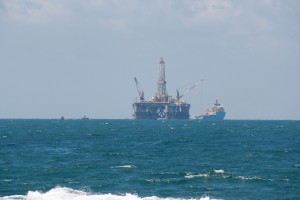I became interested in the oil and gas industry when I was an undergraduate at UBC, at a time when oil majors were increasingly setting their sites on Alberta’s lucrative oil sand reservoirs. As the industry gained traction, it began making national and international headlines for its controversial impact on the environment. With a background in political science, I involved myself in the (ongoing) debate over how to develop Canada’s natural resources while being sensitive to legitimate environmental concerns, which include qualms about greenhouse gases, damage to land and wildlife, and the effect on the clean energy industry.
 I moved to Israel in 2009, at a time when that country was engaging in its own national debate about the oil and gas industry. Two major events precipitated this dialogue: 1) as seems to be the status quo in the Middle East, political friction boiled over when Egypt cancelled a provision of the 1979 Camp David peace according to which it agreed to supply Israel with natural gas, and 2) a company discovered Israel’s first major natural gas field in the Mediterranean Sea, which became known as Tamar. Later, the company would go on to discover the Leviathan field – twice the size of Tamar – while a number of oil companies became interested in Israel’s oil shale, which is ubiquitous in certain areas of the country but remains (for now largely un-mineable with today’s technology.
I moved to Israel in 2009, at a time when that country was engaging in its own national debate about the oil and gas industry. Two major events precipitated this dialogue: 1) as seems to be the status quo in the Middle East, political friction boiled over when Egypt cancelled a provision of the 1979 Camp David peace according to which it agreed to supply Israel with natural gas, and 2) a company discovered Israel’s first major natural gas field in the Mediterranean Sea, which became known as Tamar. Later, the company would go on to discover the Leviathan field – twice the size of Tamar – while a number of oil companies became interested in Israel’s oil shale, which is ubiquitous in certain areas of the country but remains (for now largely un-mineable with today’s technology.
Following a stint in the Israel Defence Forces, I worked in journalism, where articles I wrote often touched upon Israel’s geopolitical situation with regards to natural gas issues. As a result of the research I undertook in writing the articles, I learned about the history and operations of the global oil industry, with an emphasis on its effect on international relations.
After a four-year hiatus from the Canadian oil and gas industry, I have now returned for my MBA, to find that the it is as controversial as ever. It has, however, taken on slightly new dimensions; the dialogue has changed from a focus on oil production to transport. Three major pipelines have been proposed to take Alberta’s oil out of the province. 1) the Keystone XL Pipeline, which would transport oil to refineries in the Gulf Coast of Texas, is being held up by the US State Department on environmental grounds, 2) the Enbridge Northern Gateway Pipeline would take Alberta’s oil west through neighbouring BC, but has been stalled on environmental concerns and with First Nations groups decrying impositions on native land, and 3) the Energy East pipeline, which has been opposed on environmental, safety and economic grounds.
Key oil players are having difficulties convincing civilians (read voters) about efforts they have taken to minimize the environmental impact of their industry. With an interest in marketing, I’d like to take this opportunity to suggest how the oil majors should be approaching the issue.
Firstly, oil producers and proponents of a Canada-US pipeline should address environmentalist concerns by fingering the US coal industry as being responsible for exponentially more emissions than Alberta sand oil. By focusing on the environmental rewards of weaning the US off of dirty coal, the industry can reframe itself in more progressive terms. Secondly, the industry should stress the importance of oil coming from friendly Canada as opposed to the Middle East, where dictatorial regimes – funded by oil revenues – continuously violate the rights of women, homosexuals, and ethnic minorities. In this way, the industry can frame itself as “clean.”
I feel that the oil and gas industry is unlike any other industry in the world. It is so pervasive in our everyday lives; it affects each and every one of us on such a deep level, whether we recognize it or not. I am very much looking forward to being part of the industry upon completion of my Sauder MBA.
